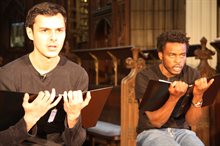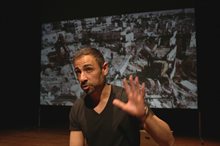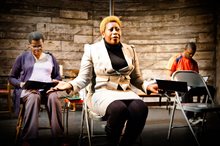After the fact
 Unlike the trials after World War Two, contemporary international trials - such as those that judged crimes committed in Rwanda and the former Yugoslavia - relied on witness (often victim) voices to help construct ‘truths’. This has led advocates of international courts to present them as spaces where victims are empowered to declare their own truth about an experience of trauma in a moment of cathartic renewal.
Unlike the trials after World War Two, contemporary international trials - such as those that judged crimes committed in Rwanda and the former Yugoslavia - relied on witness (often victim) voices to help construct ‘truths’. This has led advocates of international courts to present them as spaces where victims are empowered to declare their own truth about an experience of trauma in a moment of cathartic renewal.
 After the fact brings together Henry Redwood, PhD candidate from the Department of War Studies at King's, and Christine Bacon, Artistic Director of ice&fire theatre, to examine the triadic relationship between witness, truth and trial. The project uses theatre to explore how trials can coerce witnesses’ testimonies in order to tell particular types of stories about violence and how law can work away at these narratives over the course of a trial to leave behind only what it sees as ’relevant’ to the case. This process can be seen to funnel, filter and narrow the witnesses’ testimony so that victims essentially become silenced.
After the fact brings together Henry Redwood, PhD candidate from the Department of War Studies at King's, and Christine Bacon, Artistic Director of ice&fire theatre, to examine the triadic relationship between witness, truth and trial. The project uses theatre to explore how trials can coerce witnesses’ testimonies in order to tell particular types of stories about violence and how law can work away at these narratives over the course of a trial to leave behind only what it sees as ’relevant’ to the case. This process can be seen to funnel, filter and narrow the witnesses’ testimony so that victims essentially become silenced.
 The project will produce a 10 minute filmed performance that captures this process in the body of one performer. Using theatre enables people to powerfully and evocatively convey some of the potential hazards of using trials as tools to address past violence. The medium also allows for a more reflexive exploration of the relationship between trials, witnesses and the ethics of how episodes of violence are represented, as we also explore how the construction of a play about testimony can result in many of the same processes of exclusion and stylisation that are present in the courtroom.
The project will produce a 10 minute filmed performance that captures this process in the body of one performer. Using theatre enables people to powerfully and evocatively convey some of the potential hazards of using trials as tools to address past violence. The medium also allows for a more reflexive exploration of the relationship between trials, witnesses and the ethics of how episodes of violence are represented, as we also explore how the construction of a play about testimony can result in many of the same processes of exclusion and stylisation that are present in the courtroom.
This project is a collaboration between King's College London's Department of War Studies and ice&fire theatre, supported by university's Culture team as part of the Early Career Researchers scheme.